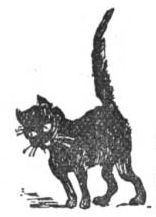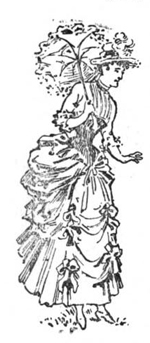[ Jerome / Three Men in a Boat ]
Jerome K. Jerome (1859 - 1927) was an English writer, primarily of humorous works. This book — its full title is Three Men in a Boat (To Say Nothing of the Dog) — was first published in 1889, and was an immediate best-seller, although critics of the time panned it for its "vulgar" humor. In print ever since, Three Men in a Boat is now regarded as something of a late-Victorian classic. If you like Victorian literature, you'll love this light-hearted (and largely fictional) account of a leisurely boat trip up the Thames River by three friends, to say nothing of the dog — who is not, alas, a Newfoundland. Newfs are mentioned twice in this book however, as noted below.
Text: taken from the first edition, published London: J. W. Arrowsmith, 1889; illustrations by A. Frederics.
The first mention of Newfs (Ch. VII) comes in the narrator's account of a previous boat trip with another friend and two young ladies who, as it turned out, were far too over-dressed for a boating excursion, wearing delicate clothing that could not get wet. The narrator struggles mightily to row the boat without splashing:
I did my best. I feathered some two feet high, and I paused at the end of each stroke to let the blades drip before returning them, and I picked out a smooth bit of water to drop them into again each time. (Bow said, after a while, that he did not feel himself a sufficiently accomplished oarsman to pull with me, but that he would sit still, if I would allow him, and study my stroke. He said it interested him.) But, notwithstanding all this, and try as I would, I could not help an occasional flicker of water from going over those dresses.
The girls did not complain, but they huddled up close together, and set their lips firm, and every time a drop touched them, they visibly shrank and shuddered. It was a noble sight to see them suffering thus in silence, but it unnerved me altogether. I am too sensitive. I got wild and fitful in my rowing, and splashed more and more, the harder I tried not to.
I gave it up at last; I said I’d row bow. [My friend] thought the arrangement would be better too, and we changed places. The ladies gave an involuntary sigh of relief when they saw me go, and quite brightened up for a moment. Poor girls! they had better have put up with me. The man they had got now was a jolly, light-hearted, thick-headed sort of a chap, with about as much sensitiveness in him as there might be in a Newfoundland puppy. You might look daggers at him for an hour and he would not notice it, and it would not trouble him if he did. He set a good, rollicking, dashing stroke that sent the spray playing all over the boat like a fountain, and made the whole crowd sit up straight in no time. (99 - 100)
The second and final mention of Newfs is in another recollection by the narrator, who is remarking on how Montmorency, the dog accompanying the three friends, is a cat-hater:

We got up tolerably early on the Monday morning at Marlow, and went for a bathe before breakfast; and, coming back, Montmorency made an awful ass of himself. The only subject on which Montmorency and I have any serious difference of opinion is cats. I like cats; Montmorency does not.
When I meet a cat, I say, "Poor Pussy!" and stop down and tickle the side of its head; and the cat sticks up its tail in a rigid, cast-iron manner, arches its back, and wipes its nose up against my trousers; and all is gentleness and peace. When Montmorency meets a cat, the whole street knows about it; and there is enough bad language wasted in ten seconds to last an ordinarily respectable man all his life, with care.
I do not blame the dog (contenting myself, as a rule, with merely clouting his head or throwing stones at him), because I take it that it is his nature. Fox-terriers are born with about four times as much original sin in them as other dogs are, and it will take years and years of patient effort on the part of us Christians to bring about any appreciable reformation in the rowdiness of the fox-terrier nature.
I remember being in the lobby of the Haymarket Stores one day, and all round about me were dogs, waiting for the return of their owners, who were shopping inside. There were a mastiff, and one or two collies, and a St. Bernard, a few retrievers and Newfoundlands, a boar-hound, a French poodle, with plenty of hair round its head, but mangy about the middle; a bull-dog, a few Lowther Arcade sort of animals, about the size of rats, and a couple of Yorkshire tykes.
There they sat, patient, good, and thoughtful. A solemn peacefulness seemed to reign in that lobby. An air of calmness and resignation—of gentle sadness pervaded the room.
Then a sweet young lady entered, leading a meek-looking little fox-terrier, and left him, chained up there, between the bull-dog and the poodle.
Needless to say, the fox terrier starts a terrible dog fight by biting the poodle. (206 - 207; Ch. XIII)
Jerome mentions a Newfoundland, briefly, in another of his works, Idle Thoughts of an Idle Fellow.

